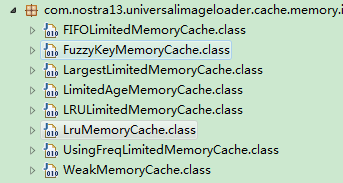Android开源框架Universal-Image-Loader学习三――UsingFreqLimitedMemoryCache源码阅读
来源:程序员人生 发布时间:2015-06-01 08:41:25 阅读次数:5006次
Universal-Image-Loader的内存缓存策略

1. 只使用的是强援用缓存
- LruMemoryCache(这个类就是这个开源框架默许的内存缓存类,缓存的是bitmap的强援用)
2.使用强援用和弱援用相结合的缓存有
- UsingFreqLimitedMemoryCache(如果缓存的图片总量超过限定值,先删除使用频率最小的bitmap)
- LRULimitedMemoryCache(这个也是使用的lru算法,和LruMemoryCache不同的是,他缓存的是bitmap的弱援用)
- FIFOLimitedMemoryCache(先进先出的缓存策略,当超过设定值,先删除最早加入缓存的bitmap)
- LargestLimitedMemoryCache(当超过缓存限定值,先删除最大的bitmap对象)
- LimitedAgeMemoryCache(当 bitmap加入缓存中的时间超过我们设定的值,将其删除)
3.只使用弱援用缓存
- WeakMemoryCache(这个类缓存bitmap的总大小没有限制,唯1不足的地方就是不稳定,缓存的图片容易被回收掉)
继承关系:

public class UsingFreqLimitedMemoryCache extends LimitedMemoryCache
public abstract class LimitedMemoryCache extends BaseMemoryCache
public abstract class BaseMemoryCache implements MemoryCache
public interface MemoryCache extends MemoryCacheAware<String, Bitmap>
@Deprecated
public interface MemoryCacheAware<K, V>
1、先来看MemoryCacheAware:
/* Interface for memory cache*/
@Deprecated
public interface MemoryCacheAware<K, V> {
/*Puts value into cache by key
* @return true - if value was put into cache successfully;false - if value was not put into cache
*/
boolean put(K key, V value);
/** Returns value by key. If there is no value for key then null will be returned. */
V get(K key);
/** Removes item by key */
V remove(K key);
/** Returns all keys of cache */
Collection<K> keys();
/** Remove all items from cache */
void clear();
}
2、现在1般使用MemoryCache替换MemoryCacheAware:
MemoryCacheAware源码:
public interface MemoryCache extends MemoryCacheAware<String, Bitmap> {
}
3、BaseMemoryCache 源码:
/*为memory cache提供1些基本功能;提供object的援用(非强援用)存储*/
public abstract class BaseMemoryCache implements MemoryCache {
/** 存储objects的非强援用,Collections.synchronizedMap保证线程安全*/
private final Map<String, Reference<Bitmap>> softMap = Collections.synchronizedMap(new HashMap<String, Reference<Bitmap>>());
@Override
public Bitmap get(String key) {
Bitmap result = null;
Reference<Bitmap> reference = softMap.get(key);
if (reference != null) {
result = reference.get();
}
return result;
}
@Override
public boolean put(String key, Bitmap value) {
softMap.put(key, createReference(value));
return true;
}
@Override
public Bitmap remove(String key) {
Reference<Bitmap> bmpRef = softMap.remove(key);
return bmpRef == null ? null : bmpRef.get();
}
@Override
public Collection<String> keys() {
synchronized (softMap) {
return new HashSet<String>(softMap.keySet());
}
}
@Override
public void clear() {
softMap.clear();
}
/** Creates {@linkplain Reference not strong} reference of value */
protected abstract Reference<Bitmap> createReference(Bitmap value);
}
4、LimitedMemoryCache源码:
/**
* 限定的Cache.提供Object的存储。所有存储的bitmap的总内存大小不超过限定值
* 注:该cache使用强援用和弱援用来存储Bitmaps;
* 强援用――对限额内的bitmaps
* 弱利用――对其他的Bitmaps
*/
public abstract class LimitedMemoryCache extends BaseMemoryCache {
private static final int MAX_NORMAL_CACHE_SIZE_IN_MB = 16;
private static final int MAX_NORMAL_CACHE_SIZE = MAX_NORMAL_CACHE_SIZE_IN_MB * 1024 * 1024;
private final int sizeLimit;
/*AtomicInteger,1个提供原子操作的Integer的类,使得操作线程安全*/
private final AtomicInteger cacheSize;
/**
* 包括存储objects的强援用。每一个object都添加到最尾端;如果hard cache的大超过了限定值,首真个object将会被删除
*(但它仍然存在在softMap中,而且可以随时被GC回收)
// 返回1个synchronizes封装的线程安全的List
public static <T> List<T> synchronizedList(List<T> list)*/
private final List<Bitmap> hardCache = Collections.synchronizedList(new LinkedList<Bitmap>());
/**构造函数:sizeLimit单位bytes */
public LimitedMemoryCache(int sizeLimit) {
this.sizeLimit = sizeLimit;
cacheSize = new AtomicInteger();
/**检测避免sizeLimit值设置过大 */
if (sizeLimit > MAX_NORMAL_CACHE_SIZE) {
L.w("You set too large memory cache size (more than %1$d Mb)", MAX_NORMAL_CACHE_SIZE_IN_MB);
}
}
/**操作成功返回true,操作失败返回false
先尝试将Bitmap添加至hard cache,再将其添加至soft cache*/
@Override
public boolean put(String key, Bitmap value) {
boolean putSuccessfully = false;
int valueSize = getSize(value); //抽象函数,返回Bitmap的大小值
int sizeLimit = getSizeLimit(); //返回sizeLimit
int curCacheSize = cacheSize.get();//返回cacheSize确当前值
/**如果添加的bitmap的size大于sizeLimit,则直接不将其添加至hard cache*/
if (valueSize < sizeLimit) {
/**判断新添加的Object的valueSize加上当前cache中已有object的curCacheSize超过限定值,则会删除适当Bitmap*/
while (curCacheSize + valueSize > sizeLimit) {
Bitmap removedValue = removeNext(); //abstract函数,返回需要删除的下1个Bitmap
if (hardCache.remove(removedValue)) {
curCacheSize = cacheSize.addAndGet(-getSize(removedValue));
}
}
hardCache.add(value); //添加到LinkedList<Bitmap>尾部
cacheSize.addAndGet(valueSize);//即cacheSize+valueSize
putSuccessfully = true;
}
// Add value to soft cache
super.put(key, value);
return putSuccessfully;
}
@Override
public Bitmap remove(String key) {
Bitmap value = super.get(key);
if (value != null) {
if (hardCache.remove(value)) {
cacheSize.addAndGet(-getSize(value));
}
}
return super.remove(key);
}
@Override
publicvoid clear() {
hardCache.clear();
cacheSize.set(0);
super.clear();
}
protected int getSizeLimit() {
return sizeLimit;
}
protected abstract int getSize(Bitmap value);
protected abstract Bitmap removeNext();
}
5、UsingFreqLimitedMemoryCache源码:(关键在于get中更新使用频率)
/**
* Limited {@link Bitmap bitmap} cache. Provides {@link Bitmap bitmaps} storing. Size of all stored bitmaps will not to
* exceed size limit. When cache reaches limit size then the bitmap which used the least frequently is deleted from
* cache(删除最少使用频率的bitmap)
* NOTE:使用强援用和弱援用;
* 强援用:for limited count of Bitmaps (depends on cache size)
* 弱利用:for all other cached Bitmaps
*/
public class UsingFreqLimitedMemoryCache extends LimitedMemoryCache {
/**
* Contains strong references to stored objects (keys) and last object usage date (in milliseconds). If hard cache
* size will exceed limit then object with the least frequently usage is deleted (but it continue exist at
* {@link #softMap} and can be collected by GC at any time)
*/
private final Map<Bitmap, Integer> usingCounts = Collections.synchronizedMap(new HashMap<Bitmap, Integer>());
public UsingFreqLimitedMemoryCache(int sizeLimit) {
super(sizeLimit);
}
@Override
public boolean put(String key, Bitmap value) {
if (super.put(key, value)) {
usingCounts.put(value, 0);
return true;
} else {
return false;
}
}
@Override
public Bitmap get(String key) {
Bitmap value = super.get(key);
// 如果value存在,则usageCount+ 1;
if (value != null) {
Integer usageCount = usingCounts.get(value);
if (usageCount != null) {
// 更新value对应的usageCount的值
usingCounts.put(value, usageCount + 1);
}
}
return value;
}
@Override
public Bitmap remove(String key) {
Bitmap value = super.get(key);
if (value != null) {
usingCounts.remove(value);
}
return super.remove(key);
}
@Override
public void clear() {
usingCounts.clear();
super.clear();
}
@Override
protected int getSize(Bitmap value) {
return value.getRowBytes() * value.getHeight();
}
@Override
protected Bitmap removeNext() {
Integer minUsageCount = null;
Bitmap leastUsedValue = null;
Set<Entry<Bitmap, Integer>> entries = usingCounts.entrySet();
synchronized (usingCounts) {
for (Entry<Bitmap, Integer> entry : entries) {
//初始化leastUsedValue
if (leastUsedValue == null) {
leastUsedValue = entry.getKey();
minUsageCount = entry.getValue();
} else {
//简单的比较得到最小值
Integer lastValueUsage = entry.getValue();
if (lastValueUsage < minUsageCount) {
minUsageCount = lastValueUsage;
leastUsedValue = entry.getKey();
}
}
}
}
usingCounts.remove(leastUsedValue);
return leastUsedValue;
}
@Override
protected Reference<Bitmap> createReference(Bitmap value) {
return new WeakReference<Bitmap>(value);
}
}
生活不易,码农辛苦
如果您觉得本网站对您的学习有所帮助,可以手机扫描二维码进行捐赠



